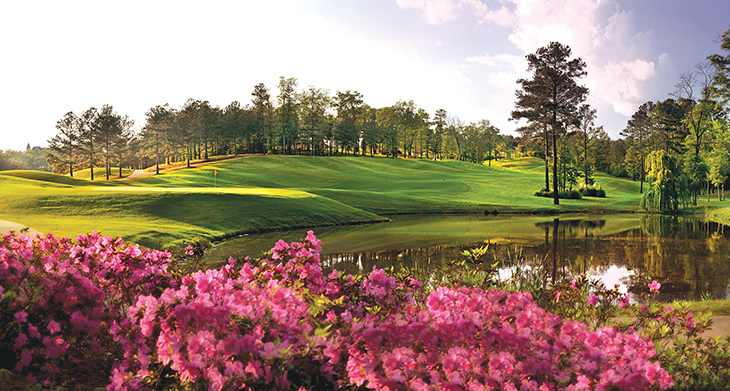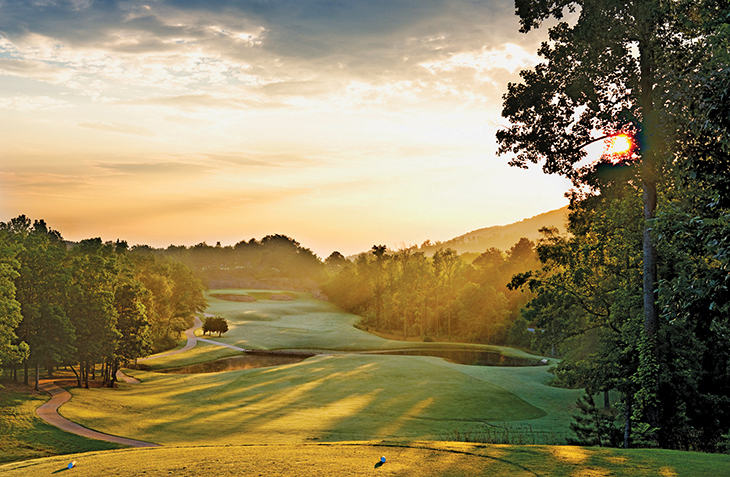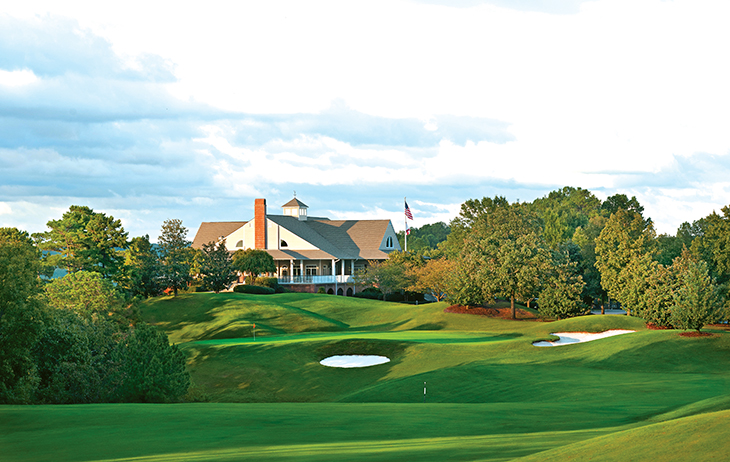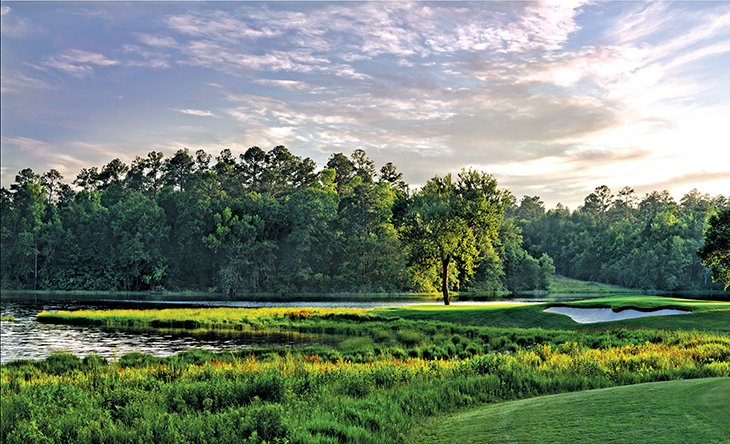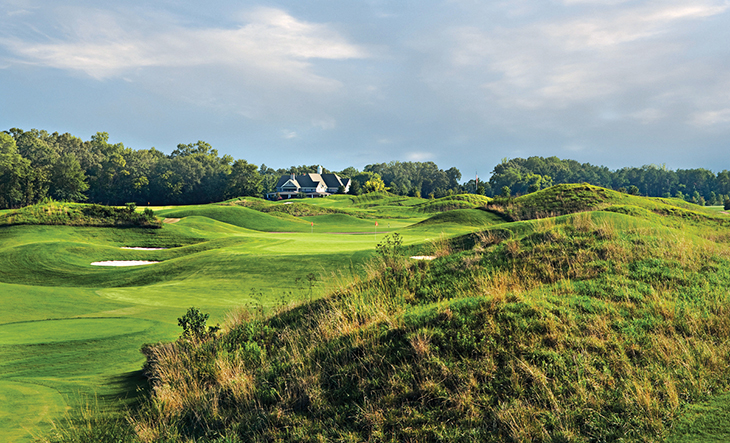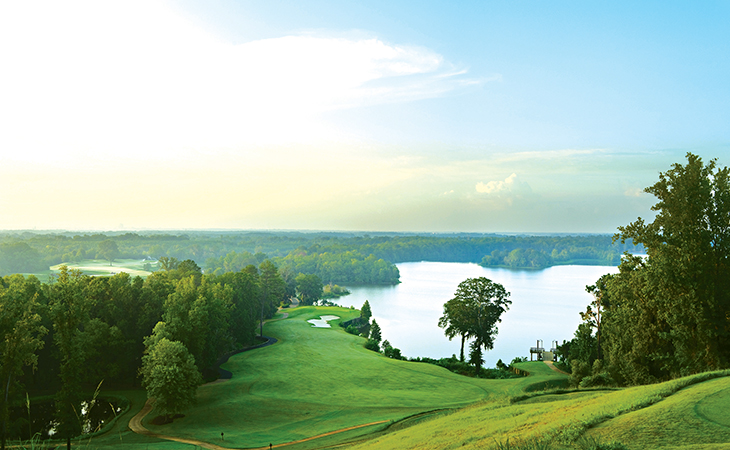Sweet Alabama And The Robert Trent Jones Trail
A trail of many courses designed by the legendary Robert Trent Jones, culminates in one spectacularly long and testing tract called Ross Bridge.
By Benny Teo
In the fleeting light of a warm September evening, the skirl of the pipes from a lone piper can be heard echoing off the surrounding hills in Hoover, Alabama. Playing of the bagpipes is a tradition and a reminder of the historical roots here at the Renaissance Birmingham Ross Bridge Golf Resort and Spa. The Ross family that homesteaded this land long before it became a sprawling resort and residential community and site of the second longest golf course in the America, was Scottish.
According to the Hoover Historical Society, James Taylor Ross migrated to the South in 1858 and acquired the land in what is now Shades Valley. Ross eventually moved west and his land was purchased in 1907 by the Tennessee Coal Corp, which later became the U.S. Steel Corp. In 2002, U.S. Steel’s real estate division combined with Daniel Corp., and the Retirement Systems of Alabama to develop the bordering residential resort community of Ross Bridge.
The hotel, with its 259 guest rooms including 11 suites, is not really a hotel in the same sense, at least architecturally, as most travellers might envision. In keeping with the Scottish flavour of the place, this is an aristocratic Scottish manor with high stone peaks, almost castle-like, accenting this sprawling structure which stands stately, overseeing the carefully manicured grounds. One could almost hear The Bard himself, Robbie Burns looking about and pronouncing in his Scottish twang, “Hoots mon! Tis a grand wee place ye have.”
Of course, a focal point of the “grand wee place” is the Ross Bridge golf course, one of the newest additions to Alabama’s famous Robert Trent Jones Trail. The trail is composed of 26 public courses at 11 sites throughout the state, so some sites have 36 and even 54 holes. The trail was the idea of Dr. David Bonner, CEO of the Retirement Systems of Alabama, which funded the trail to help expand tourism, recruit industry, attract retirees and ultimately boost the state’s economy.
The RTJ Trail is one of many things that have brought attention and millions of visitors to this warm and charming state. Things like the mouthwatering barbeque ribs at the iconic and original Dreamland Café in Tuscaloosa’s Jerusalam Heights; the highly popular sport of NASCAR; being the home of such sports greats as ‘Hammerin’ Hank Aaron, the ‘Brown Bomber’ Joe Louis and the ‘Say Hey Kid’ Willie Mays; and is a hotbed of college football with the Crimson Tide of the University of Alabama and Auburn’s Tigers. Their football stadiums alone are worth seeing. The Crimson Tide’s home field seats over 101,000. That’s a whole lot of hormonally charged college kids screaming their lungs out over hotdogs and soda.
Since opening more than two decades ago, the RTJ Trail has been more than a hit with over 10 million rounds of golf played on these courses, which has helped increase the state’s tourism dollars from $2.5 billion to upwards of $9 billion annually. It would be a chore to play all 26 courses on one visit but Ross Bridge, which has hosted the Regions Charity Classic, a PGA Champions Tour event, is definitely a good place to start.
On arriving at the first tee of this 8,191-yard (you saw it right!) monster, the starter’s welcoming speech is memorable. “Gentlemen,” he says with a southern drawl, “I wholeheartedly suggest you play this course from a distance best suited to your game. Each hole has five tee areas,” and began pointing them out. “Up there is your forward tees, then the whites, the orange, the red and back there,” he gestures, pointing to the very back black tee area, “that’s just stupid.” He may also point out that the course is over a mile longer playing from the tips as opposed to playing it from the forward tees, so leave the ego behind and think with the right head.
Right from the start, you will be glad to have spent a few moments on the practice range as the first hole is a par 5, with a fairway bunker on the right and water on the left. You will need a straight tee shot over a slight knoll which blocks out your view of the green.
However, once over the knoll, you will clearly see how the course opens up and where to play your next shot. The green is elevated with large bunkers guarding the front. For most players, it is three shots to get there. Elevated greens guarded by large sand bunkers in front is a familiar characteristic of Jones’ design style and is prominent throughout the trail courses here in this area.
Water, you will find, is significant around Ross Bridge. Ten holes play along the banks of two artificial lakes connected by a long, narrow waterfall between greens nine and 18. In fact, holes two through four have water. The 4th is particularly interesting. The yardage from the back tee is 226 yards but again pick your distance because the ball flight is over water with a bit of a bailout area to the right. To the right of the green is a pump house with a large water wheel which adds a nice scenic touch.
The 9th is another intimidating water hole. With a small lake all down the left side, don’t let the beauty of this hole distract you from a solid tee shot up the right centre. This is a par 4 that measures 518 yards from the tips but plays longer into the wind. From the third level tees, it measures 377 yards.
Before you tee off on the inward nine of this parkland setting, drink in the warmth of the afternoon and listen to the unmistakable hum of the cicadas (Latin for tree cricket). Although they are found in many parts of North America, they just seem to be more engrained in this southern environment.
The 10th, at 387 yards from the white tees, is a slight dogleg to the right. It is a challenge for the average golfer with a second shot uphill to a raised green which is well bunkered in front. A bit of advice here. Take one more club for that second shot.
The 11th hole is another tough par 3. It has a false front and closely mown collection areas. If you miss the putting surface, making par becomes much more difficult.
The 13th hole, a long par 5 downhill, has one of several elevation changes you will find on this track, is topped out at 698 yards from the back tee. However, again don’t let the yardage fool you if you are long off the tee. Long hitters do have a chance to reach the green in two and lots of room for others to lay up and pitch on for a birdie chance. Water comes into the equation on four of the last five holes.
The finishing hole is a real corker. With the hotel high behind the green as a backdrop, your tee shot is a forced carry over water. There are fairway bunkers to contend with off the tee so shot placement is essential on this dogleg right hole. The water also curls up along the right side of the fairway and around the green making your second shot into the green a bit testy.
One thing I particularly liked about this course was the variety. Every hole seemed to have its individual attraction. It is also reasonably priced for a course of this calibre. Greens fees range between US$90 and US$125. The Renaissance Resort, with all its quality amenities, is actually a good place to be based for a golf vacation in the central part of Alabama.
Green fees on the Trail are very affordable: Most courses may be played for around US$65 plus tax. About two miles from Ross Bridge is Oxmoor Valley which has three, 18-hole courses where green fees range from US$40 to US$62.
There are 54 holes total here, 18 of which are the Short Course. The Valley’s 441-yard, par-four 18th is called The Assassin, and you can probably figure out why. The Ridge Course’s 12th hole features a shelf of exposed shale rock that recalls the region’s mining past.
And within a two-hour drive of the resort there are several other RTJ Trail sites such as Capitol Hill in Prattville which has three courses, named Senator, Judge and Legislator, and all over 7,400 yards. The Senator had hosted an LPGA event, the Yokohama Tire Classic as well and tests the ladies with its more than 150 pot bunkers.
The Judge course also had some notes of interest. It has been deemed to be the toughest test on the trail with lots of water and challenge. Playing along the Alabama River, its magnificent first hole offers a 200-feet drop off from tee to fairway. Green fees run from US$40 to US$74.
To the southeast of Oxmoor, in Opelika, the site of Auburn University there is the 54-hole golf offering at Grand National. Consisting of two 18-hole challenges and another 18-hole par 3 course. With the Lake Course playing over 12 watery holes, Jones himself remarked that this was “the single greatest site for a golf complex ever.”
Another super long course, The Fighting Joe at The Shoals in Florence, plays to more than 8,000 yards from the back tees while Schoolteacher can get pretty close to that length, as well. Not surprisingly, both are challenging with green fees ranging from US$40 to US$65.
At Greenville, you will find Cambrian Ridge, an off the beaten path track with three loops of nine holes and another 9-hole Short Course. It’s Canyon nine opens with a steep drop off, much like The Judge at Capitol Hill.
Then, there is Magnolia Grove in Mobile, where two 18-hole courses, The Crossings and The Falls, offer beautiful surrounds mixed with a challenge that sets the pace for another LPGA championship, The Airbus Mobile Bay LPGA Classic. Its par 3 course has been lauded as among the best in the country.
In all, there are approximately 140 courses accessible to the public in this state and a lot of good golf to be played here. So grip it, rip and enjoy Sweet Home Alabama.
For more information, visit www.rtjgolf.com
More posts

Similar, Yet Different Customized Skincare
30 Nov 2024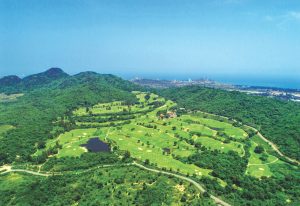
THE PRIVILEGE OF MEMBERSHIP
20 Nov 2024
